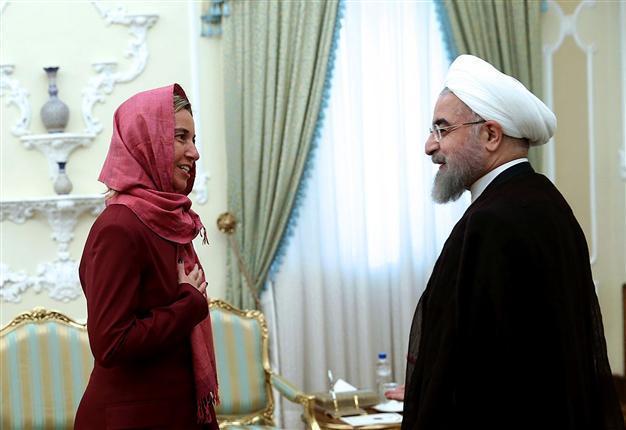EU's Mogherini in Iran to discuss nuclear deal, region: TV
ANKARA - Reuters

AFP photo
Iran and the European Union have agreed to start talks on issues including confronting terrorism, Iranian Foreign Minister Mohammad Javad Zarif told a news conference with the EU's chief diplomat in Tehran on July 28.EU foreign policy chief Federica Mogherini arrived for a one-day visit to discuss implementation of an agreement for Iran to curtail its nuclear programme in return for lifting sanctions against the country, state TV reported.
"We have agreed to hold high-level talks between Iran and the European Union over different issues, including energy cooperation ... human rights, confronting terrorism and regional issues," Zarif said after meeting her.
The nuclear agreement was reached on July 14 in Vienna between Iran and the United States, France, Russia, China, Britain and Germany. It is intended to end more than a decade-old standoff over Tehran's disputed nuclear programme.
After the terms of the agreement were settled, Supreme Leader Ayatollah Ali Khamenei said Tehran would not end its support for regional allies, including the Lebanese Hezbollah, Syria's government and Shi'ites in Bahrain and Yemen.
The United States designates Iran and Syria as "state sponsors of terrorism" and Hezbollah as a "terrorist organisation."
Mogherini said implementation of the agreement "depends on political will, commitment and patience of all parties involved ... The deal has the capacity to pave the ground for wider cooperation between Iran and the West."
"Regional and international cooperation with Iran is very important for us."
Writing on the op-ed page of Britain's Guardian newspaper, Mogherini said EU foreign ministers have tasked her with exploring "ways in which the EU could actively promote a more cooperative regional framework" in the wake of the Vienna deal.
"The whole Middle East is in turmoil. Sectarianism is on the rise. We need to restart political processes to end wars. We need to get all regional powers back to the negotiating table and stop the carnage," Mogherini wrote.
"Cooperation between Iran, its neighbours and the whole international community could open unprecedented possibilities of peace for the region, starting from Syria, Yemen and Iraq.
On July 27, Mogherini met Saudi officials to try to calm the concerns of Iran's arch-rival over the agreement. The Sunni Muslim kingdom and its Gulf Arab allies accuse Tehran of meddling in Bahrain, Iraq, Syria, Lebanon and Yemen.
They suspect the agreement will give Iran more leeway to back allies in proxy wars from Yemen to Syria by freeing Shi'ite Muslim Iran from international pressure and sanctions.
Riyadh accused Iran on Monday of harboring hostile designs against its regional neighbors. Bahrain's state news agency reported on July 28 the explosives used in a bombing that killed two policemen were similar to those recently seized by security forces after allegedly being smuggled from Iran.
Iran has repeatedly denied interfering in the internal matters of its neighbours, saying such claims are aimed at preventing cooperation between Iran and the region.
Iranian media said Mogherini would press for a political solution to the Yemeni conflict, where Saudi-led air strikes have pounded Iranian-backed Shi'ite Houthi rebels.
"Instead of confrontation and rivalry in the region, cooperation will be for the benefit of everyone," Mogherini told the news conference.
Mogherini later President Hassan Rouhani, Iranian state television reported without giving further details.
















